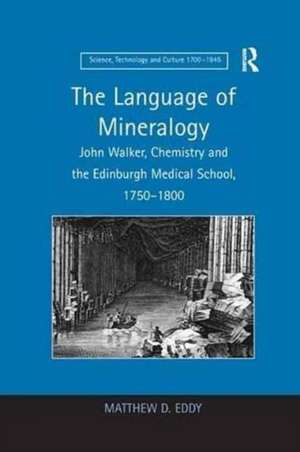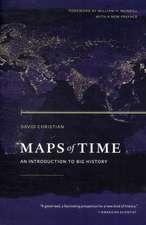The Language of Mineralogy: John Walker, Chemistry and the Edinburgh Medical School, 1750-1800: Science, Technology and Culture, 1700-1945
Autor Matthew D. Eddyen Limba Engleză Paperback – 15 noi 2016
| Toate formatele și edițiile | Preț | Express |
|---|---|---|
| Paperback (1) | 469.34 lei 6-8 săpt. | |
| Taylor & Francis – 15 noi 2016 | 469.34 lei 6-8 săpt. | |
| Hardback (1) | 1054.71 lei 6-8 săpt. | |
| Taylor & Francis – 28 dec 2008 | 1054.71 lei 6-8 săpt. |
Din seria Science, Technology and Culture, 1700-1945
-
 Preț: 310.88 lei
Preț: 310.88 lei -
 Preț: 475.16 lei
Preț: 475.16 lei -
 Preț: 469.34 lei
Preț: 469.34 lei - 18%
 Preț: 299.52 lei
Preț: 299.52 lei -
 Preț: 469.34 lei
Preț: 469.34 lei -
 Preț: 469.34 lei
Preț: 469.34 lei -
 Preț: 489.26 lei
Preț: 489.26 lei -
 Preț: 464.12 lei
Preț: 464.12 lei -
 Preț: 489.26 lei
Preț: 489.26 lei - 30%
 Preț: 820.73 lei
Preț: 820.73 lei -
 Preț: 469.34 lei
Preț: 469.34 lei -
 Preț: 486.49 lei
Preț: 486.49 lei -
 Preț: 416.22 lei
Preț: 416.22 lei -
 Preț: 469.34 lei
Preț: 469.34 lei -
 Preț: 469.34 lei
Preț: 469.34 lei - 22%
 Preț: 259.98 lei
Preț: 259.98 lei - 22%
 Preț: 259.98 lei
Preț: 259.98 lei - 12%
 Preț: 299.52 lei
Preț: 299.52 lei - 30%
 Preț: 821.13 lei
Preț: 821.13 lei -
 Preț: 489.26 lei
Preț: 489.26 lei - 26%
 Preț: 248.30 lei
Preț: 248.30 lei - 26%
 Preț: 876.78 lei
Preț: 876.78 lei -
 Preț: 383.93 lei
Preț: 383.93 lei - 16%
 Preț: 261.54 lei
Preț: 261.54 lei - 18%
 Preț: 1001.77 lei
Preț: 1001.77 lei
Preț: 469.34 lei
Nou
Puncte Express: 704
Preț estimativ în valută:
89.82€ • 97.53$ • 75.45£
89.82€ • 97.53$ • 75.45£
Carte tipărită la comandă
Livrare economică 22 aprilie-06 mai
Preluare comenzi: 021 569.72.76
Specificații
ISBN-13: 9781138265646
ISBN-10: 1138265640
Pagini: 332
Dimensiuni: 156 x 234 mm
Greutate: 0.45 kg
Ediția:1
Editura: Taylor & Francis
Colecția Routledge
Seria Science, Technology and Culture, 1700-1945
Locul publicării:Oxford, United Kingdom
ISBN-10: 1138265640
Pagini: 332
Dimensiuni: 156 x 234 mm
Greutate: 0.45 kg
Ediția:1
Editura: Taylor & Francis
Colecția Routledge
Seria Science, Technology and Culture, 1700-1945
Locul publicării:Oxford, United Kingdom
Cuprins
Contents: Introduction; Who was John Walker? The life of a notable naturalist; Sorting the evidence: analysis and the nomenclature of matter; Becoming a naturalist: travel, classification and patronage; Systematic mineralogy: arranging the fabric of the globe; Ordering the Earth: the chemical foundations of geology; Conclusion; Appendices; Bibliography; Index.
Notă biografică
Matthew D. Eddy is a Lecturer at the University of Durham, UK
Recenzii
'The Language of Mineralogy ranges far beyond the traditional canon of philosophical texts to fashion important new perspectives on the intellectual and social world of the Scottish Enlightenment. John Walker's multi-faceted life as a teacher, field naturalist, clergyman, and advisor and companion to powerful aristocratic patrons is a rich quarry that Matthew Eddy exploits with authority and elegance. His book brings to centre-stage the painstaking tasks of classification in which Walker excelled. In doing so, it sets systems of natural history as a matter of central concern at the fertile interface between chemistry and mineralogy within the Edinburgh Medical School. As Eddy shows, such systems were anything but the static impediments to creative thought that they have too often been taken to be. The rehabilitation they receive in this book is long-overdue. This is cultural history of a high order.' Professor Robert Fox, University of Oxford 'In this detailed study of the scientific career of John Walker, Professor of Natural History at the University of Edinburgh in the late eighteenth century, Matthew Eddy has created a rich intellectual and social tapestry that greatly enhances our understanding of the scientific mindsets and activities of the Enlightenment. Eddy uses Walker's principal scientific interest in mineralogy to illustrate the relations and interactions between different sciences of the time, such as chemistry, medicine and geology. He also provides a detailed study of the commercial, industrial, social and cultural contexts of Walker's science and shows concretely how Walker participated in the international scientific 'republic of letters'. Eschewing retrospective "Whig" evaluation enables Eddy to present and analyze Walker's scientific theories and practices in mineralogy and geology with great historical empathy. We really get to feel what the sciences of chemistry, mineralogy and geology were like in the era before the triumph of Lavois
Descriere
The specific methods used to construct Enlightenment systems of natural history have proven to be the bête noir of studies that address eighteenth-century culture. This book shows how the classification practices of a defined institutional setting enabled naturalists to create systems of natural history and, by explicitly connecting eighteenth-century geology to the chemistry being taught in medical settings, offers a new interpretation of the nascent earth sciences as they were practiced in Enlightenment Britain.











